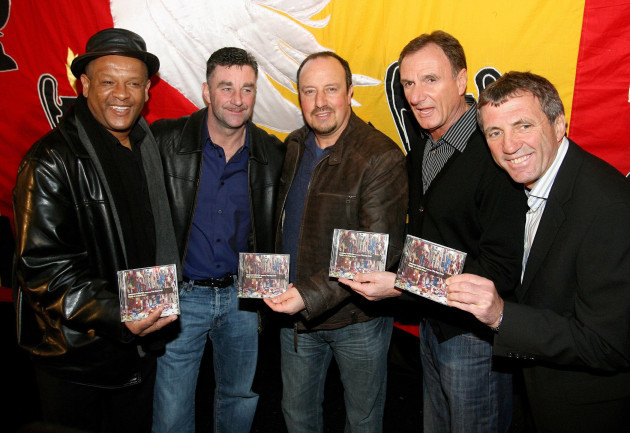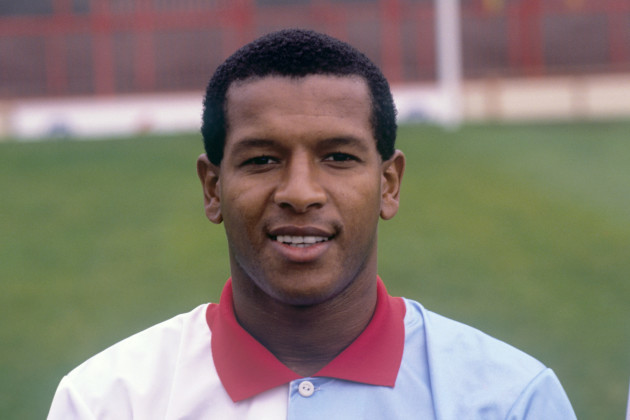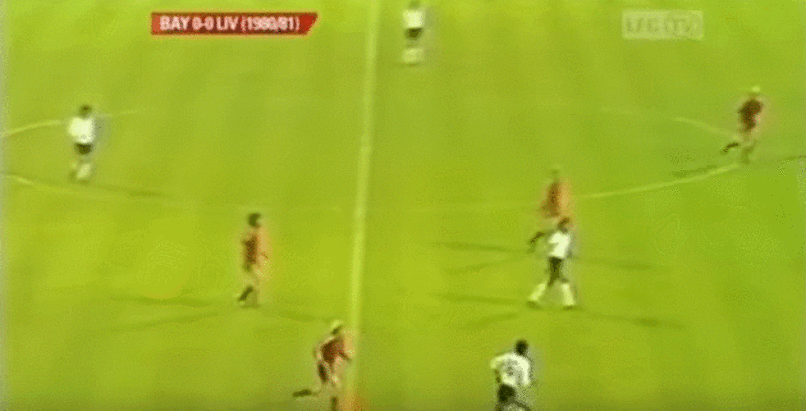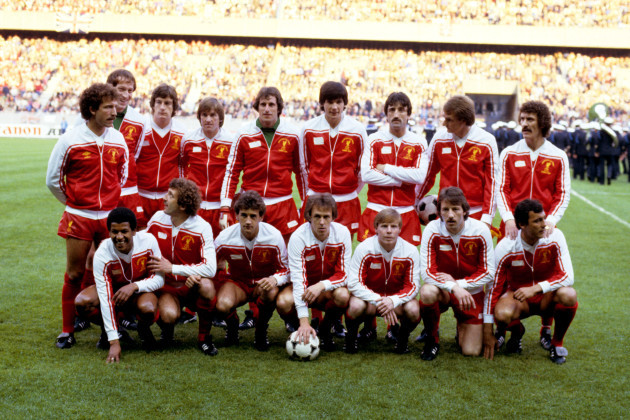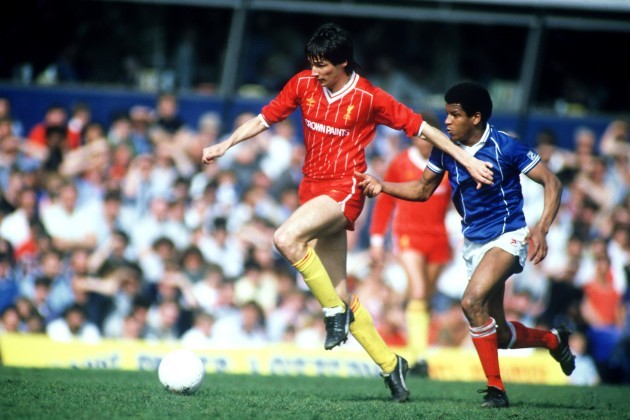DESPITE ONLY PLAYING five times for Liverpool, Howard Gayle unquestionably left his mark on one of the world’s most famous football clubs.
The local boy who grew up to become the first black player to play for Liverpool in their 88-year history, was forced to overcome many obstacles in the process, including bigotry and prejudice.
But the social climate 40 years ago was totally different than it is now; both in and outside of the game.
Today, the Premier League is one of the most cosmopolitan entities in sport, with the division becoming more culturally diverse every season.
At Watford, for example, their 25-man first-team squad features 19 different nationalities from Europe to Africa to the Americas, but that hasn’t always been the case for English clubs.
“I always just saw myself as a footballer trying to make it,” Gayle tells The42.
“They would have had black players on the books at youth level at Liverpool, but I was actually the first black player to sign a professional contract at the club, and then the first to play for the first team. And that started to make headlines in the newspapers.”
The boyhood Liverpool supporter, who found himself in trouble with the law at a young age for, amongst other crimes, dealing stolen goods, was a regular at Anfield and at away grounds around England to support his heroes from the terraces in an era of violent and destructive football hooliganism.
In many ways, his love for the team helped the fans to embrace the player as one of their own. But it was much harder within the club, when he signed in 1977.
In his autobiography, Gayle describes the iconic Tommy Smith as his ”biggest problem at Liverpool” with his alleged snide racial comments nearly leading to the two trading blows in training.
However, that was far from an isolated case in the largely white environment, with his presence at the club making other players feel uneasy.
“There was always banter in the changing room,” Gayle says.
“But when the banter turned to race or colour, I put a stop to it. I made it clear that I was uncomfortable with what was being said.
“I was always viewed as outspoken against it, and some players didn’t like that.
“They may say something and I would know if they have said something wrong. They would wait for a response, which in most cases, they would get.
“But you’d also get players who would have had the same understanding as me. I’m talking about white players, who would hear some comments, and also feel uncomfortable with what was being said. They wouldn’t agree with it at all.
“I earned a bad reputation within the club. People thought I had a chip on my shoulder because I stood up to any racial adversity.”
Gayle would go on to make his senior debut three years after signing professional terms with the club, when he came on as a substitute against Manchester City in the place of David Fairclough.
But the early 1980s was a time when racial abuse from the crowd and fellow players was still widely accepted within the game.
“The only way I could fight it was to play well and to make sure my team won,” Gayle explains.
“Any chance I got for a bit of retribution on the pitch to anybody that said anything, I would take. I would take any opportunity, once it wouldn’t get me sent off or get me in trouble with the authorities.
“I stood in the middle of the pitch one day with somebody calling me a n****r, and I said to the referee, ‘Are you going to do something?’
“The referee told me it was my problem.
“I then said to him ‘If was to grab him by the throat and beat the life out of him, are you going to tell me it’s my problem? Or are you going to send me off?’
“He just walked away. Those were the kind of things I had to deal with.
“Years ago, the racism that black players endured was acceptable. It was the norm. You just had to get on with it. Now it is a criminal offence – on or off the pitch. The only thing we could do was to play well, and silence the bigots.”
The winger, who could also play as a forward, was a prolific scorer for Liverpool’s successful reserve side and netted 62 goals in 156 matches for the second-string outfit, where he played with legendary figures such as Ronnie Whelan, Alan Hansen and Ian Rush.
With first-team opportunities limited, Gayle spent time on loan at Second Division side Fulham and returned a more battle-hardened player.
Chances to impress in the first team remained rare, but suddenly an opportunity arose when Liverpool were missing several key players, including Alan Kennedy and Phil Thompson, ahead of their daunting European Cup semi-final second leg at Bayern Munich’s Olympic Stadium.
Consequently, Gayle was named among the substitutes for the crucial match with the game scoreless after the first leg.
And after Kenny Dalglish limped off the pitch in the early stages following a heavy tackle, Gayle was summoned from the bench for only his second appearance for the club. His big moment to make a statement on the pitch had arrived, in what was a volatile and hostile environment.
Manager Bob Paisley had hoped that Gayle would act as an unknown quantity for the German defence, and he was right. His blistering pace and skill on the ball subsequently caused havoc for the home side.
Gayle terrorised Bayern’s defenders all night, amid monkey chants that rang around the stadium every time he touched the ball.
In the first half of the game, Gayle made an immediate impact and should have been awarded a penalty when Bayern defender Wolfgang Dremmler appeared to foul the Liverpool forward in the box, but appeals for a penalty fell on deaf ears.
Then mid-way through the second period the tricky winger picked up a yellow card for a late challenge, an act of retaliation perhaps after being repeatedly targeted by Bayern throughout the match. He was soon replaced by the more experienced Jimmy Case, with the game still in the balance.
The substitute was being substituted, much to the frustration and annoyance of the youngster. The euphoric high of playing in Liverpool’s most important game of the season quickly turned into a dispiriting low.
Gayle feels that lack of trust and belief in his ability defined his six-year stay at the club.
“I had so much to offer that game, but Bob Paisley didn’t trust me,” Gayle recalls about his 61 minutes on the pitch.
“I committed one foul in the game, it wasn’t a booking offence, but the referee gave me a yellow card. He probably felt he had to. He had booked four or five of their players already in the game.
“The manager didn’t want to face the prospect of going into extra time with 10 men, if I was to do something stupid.
“That lack of trust really disappointed me. I was only sent off twice in my entire career. I felt I had more to offer.”
Still, Liverpool would go on to reach their first European Cup final in three years as Ray Kennedy stuck in the 83rd minute to give the visitors the lead.
Karl-Heinz Rummenigge replied five minutes later to produce a tense final few minutes, but Liverpool held on to set up a meeting in the final with Spanish giants Real Madrid, thanks to the away goal rule.
Three days later, Gayle made his full debut at White Hart Lane against Spurs in the league, and he marked the occasion with a goal after 22 minutes.
And although Gayle started two out of the three matches in the lead up to the European Cup final, a refreshed Dalglish was deemed fit enough to start in Paris.
But it was Alan Kennedy who proved to be the hero as his decisive strike in the closing stages resulted in Liverpool becoming champions of Europe for the third time in five years, with Gayle forced to watch the entire proceedings from the bench.
He didn’t know it at the time, but Gayle would never play for Liverpool’s first team again, with the following two seasons mostly spent with the reserves.
A short loan spell with Newcastle United followed in the 1982-83 season before Gayle departed for Birmingham City at the end of the campaign. His time was up and he can still recall the exact moment he knew it was time to leave the club.
“I remember I played in a reserve game on a Wednesday and I scored a hat-trick, and the general belief was that I was at least going to be in the squad for the next game.
“We were playing away at Ipswich and we got beat 1-0, and they didn’t take me.
“Roy Evans [the reserve team coach] told me ‘If I was you, I’d go to a different club because I’ve been batting your corner in there and they are not having it.’
“When your coach tells you that, you have to listen.
“There was a lot of unfulfilled potential. I feel I wasn’t given the opportunity. I didn’t come through Liverpool’s apprentice system, I didn’t get to Liverpool until I was 19.
“I was training with seasoned internationals, who were the best team in England. If you’re good at training with them, you knew you could play.
“They knew I was a good player and that I had the skills to compete with anybody.
“My brother used to say that I had to be twice as good as anybody as I was competing with for a position, and he was right. If I was white, I may have played more times.
“But I hope in some sort of rounded way, I helped the club understand more about the black culture with the likes of John Barnes, Michael Thomas and Emile Heskey playing after me. I would like to think there is still some sort of legacy.”
After Birmingham, there were stints at Sunderland, Stoke City, Blackburn Rovers and Halifax Town, and a period in the United States with the Dallas Sidekicks in the Major Indoor Soccer League.
On the international stage, Gayle also helped England retain their European U21 Championship title in 1984, as a designated overage player.
After being involved in the game for the majority of his life, Gayle remains adamant that racism is not a problem solely for football, but rather society at large.
“As a unit and as a sport, football does more to combat racism than governments do.
“A person could be a racist until 5-6pm on a Saturday afternoon and say nothing, then after the game, they can go back to being a racist where there are no cameras.
“Racism is a problem for society, and it is starting to get worse publicly again with what is going on around the world.”
Today, Gayle is heavily involved in campaigning for racial equality and is an ambassador for Show Racism the Red Card, the anti-racism charity.
And last year, Gayle was in the headlines again after he was nominated for a Member of the British Empire honour for his charity work, but he turned it down as he felt it would be a ‘betrayal’ to the people who suffered under British colonial rule.
“I never had any doubts in my mind that it was the right decision,” said Gayle, whose father came to England from Sierra Leone, while his mother was of Ghanaian descent.
“This was a decision made by me, I wasn’t coerced by anybody.
“My culture and upbringing is always something that I paid special attention to. When I look back on history, and the history I was taught in school, it was largely a lie in relation to Africa. Thanks to the internet, people have sourced the information themselves and more info about slaves is coming out.
“Because of my ancestry, there is no way I could walk around with Member of the British Empire after my name, after seeing what the Empire did to my family and ancestors.
“If somebody wants to take it, that’s their choice, changing the name of the honour to something more community-oriented or more inclusive would help, but my choice is not to take it based on my beliefs and my principles.”
61 Minutes in Munich: The Story of Liverpool FC’s First Black Footballer by Howard Gayle is published by deCoubertin Books. More info here.
The42 is on Instagram! Tap the button below on your phone to follow us!
